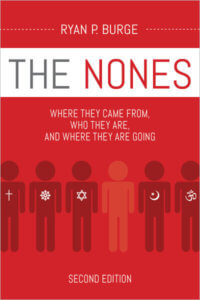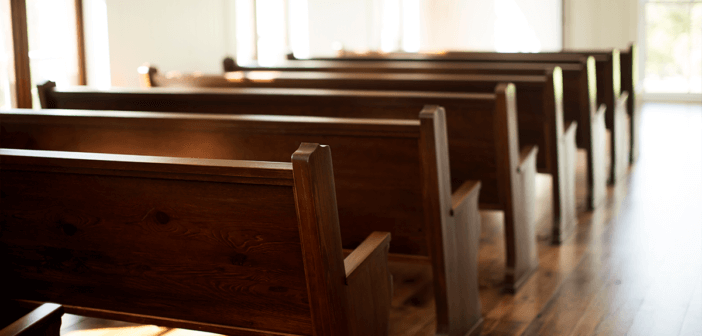What is the church to do in the face of increasing rates of religious disaffiliation and the rise of the Nones? Researcher and pastor Ryan Burge says it’s important that the church not lose hope. We must continue to step out in faith and sow the seeds of love, grace, and hope.
How do people of faith deal with the overwhelming fact that the America of tomorrow will look nothing like the America of thirty years ago? Reinhold Niebuhr succinctly captures the advice I would give the modern church about how to respond to the rise of the Nones: “God, grant me the serenity to accept the things I cannot change, the courage to change the things I can, and the wisdom to know the difference.”
What we can and cannot change
Let’s begin with the things that cannot be changed. I think that no matter how effective the church was at evangelism or missions or community service over the past four decades, those efforts would have been only slightly effective at stopping the rise of the Nones. The best apologists, the most charismatic speakers, or the catchiest praise and worship bands would not have held secularization at bay. There’s no way to know for certain, but it’s fair to say that a significant chunk of the increase in the unaffiliated was due to shifts in American culture away from religion. The reality is simply this: Americans used to be Christians simply by default, not because of their belief in the words of the Apostles’ Creed. Rising secularization has merely given permission for a lot of people to express who they truly are — religiously unaffiliated.
But at the same time, religious belief in this country is still surprisingly robust. In 1988, 2 percent of respondents to the General Social Survey said that God didn’t exist and another 4 percent said that God might exist but there’s no way to find out. In 2018, just 7 percent of people said that there was no God, and 9 percent said there was no way to know for sure. While about 30 percent of Americans no longer affiliate with religion, just 16 percent of Americans do not believe God exists. The issue is not that interest in spiritual matters has declined; it’s that people do not want to label themselves as a Christian, Mormon, or Buddhist.
Moving forward in the face of hopelessness
The church I currently serve had fifty regular worshippers when I assumed the pulpit thirteen years ago. Today, we are down to about fifteen most Sundays. We’ve had weeks when the total attendance was in the single digits. Again, I thought that if I set myself on fire, people would come to watch me burn. That’s not what happened. About five years into my ministry, I became listless and angry. Why wasn’t the church growing? Why can’t we bring in some young people? I thought of myself as a failure. I kept thinking about what the church used to be — nearly three hundred members with activities almost every day of the week and a tremendous influence on the community. Now we were struggling to keep the lights on. After a period of wallowing, I realized that our church must simply move forward.
It brought to mind a conversation between two characters in the 2014 movie “Wish I Was Here.” Aidan, played by Zach Braff, is racked with grief that his father, Gabe, has had a reoccurrence of cancer. Aidan exclaims, “There’s so much bad news all at once. What do we do?” And Gabe calmly responds, “What do you mean, ‘What do we do?’ We move forward. It’s the only direction God gave us.”
Stepping out in faith
So, we stepped out in faith and began packing brown paper sacks filled with food for schoolchildren who were struggling with poverty in our community. We started with thirty bags per weekend. We had no idea if it would work or if we could actually afford it. Nearly a decade later, we pack nearly three hundred bags of food each weekend and serve three local schools. Every time we think that the money is going to run out, a check shows up. Our food program was the avenue we took to keep moving forward.
When we first started organizing our brown bag program, some members of the congregation thought that we should drop a tract into the bags, but I refused. For me, the purpose of those bags was not to try to bring people to Christ. It was to show those kids that someone they don’t even know loves them and wants to help. So, we just include a simple note saying who we are and what we are doing. We make sure to let them know that if they need help, they can just give us a call.
Well, one Friday, the phone rang. It was a grandmother of one of the children who had received a bag. The temperature had begun to drop, and her grandson didn’t have a warm coat. She asked for help. It just so happened that we were having a rummage sale that weekend and had a fellowship hall full of clothes. We invited her to come down and take whatever she needed. Just an hour later, she and her grandson stuffed two armloads of clothes into her trunk and drove away.
I have no idea if that young man or his grandmother will ever come to know Christ. But here’s what I do know: they left our church that day knowing that they were born in the image and likeness of God and that people who they had never met cared deeply about them. When that young man is sitting around as an adult one day, talking about spiritual things, he might have some bad things to say about the church, but I hope that when he tells his story of faith, he at least makes mention of the one time when he needed help and a church came to his rescue. That young man’s story of faith will be just a bit different because of what our little church did for him.
Just keep throwing out seed
One of my favorite parables from the Gospel of Matthew involves a farmer who is trying to plant seed. Jesus notes that some of the seed falls on inhospitable soil and never takes root, while other seed manages to find fertile ground, takes root, and creates a bountiful harvest. I firmly believe that the church needs to stop trying to control where the seed lands. The winds of secularization and polarization are swirling like never before. Most of that seed is going to fall on rocky soil, never to reap a harvest. And it seems that there are fewer people to spread it every year. It’s easy to give up hope. But we must recall the words of the apostle Paul to the church in Galatia: “So let us not grow weary in doing what is right, for we will reap at harvest time, if we do not give up” (Gal 6:9). Seed that expresses the love and grace and hope of Jesus Christ is never truly lost. Don’t give up!
 Adapted from The Nones by Ryan Burge copyright © 2021, 2023 Fortress Press. Used by permission. The book is available at Fortress Press, Cokesbury, or Amazon.
Adapted from The Nones by Ryan Burge copyright © 2021, 2023 Fortress Press. Used by permission. The book is available at Fortress Press, Cokesbury, or Amazon.
Related Resources
- Who are The Nones? featuring Ryan Burge — Leading Ideas Talks podcast episode | Podcast video | In-depth interview
- Understanding the Nones by Ann A. Michel
- The “Nones” and the Spirituality of Everyday Living by Keith Anderson






